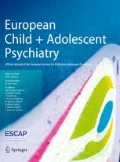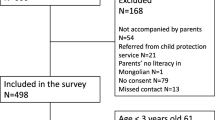Abstract
Objective
To examine the psychometric properties of the Strengths and Difficulties Questionnaire (SDQ) parent version and to determine the effects of age, gender, country and investigator type (paediatrician, child psychiatrist, other physician) on the SDQ scores in the prospective, non-interventional ADORE study.
Methods
The SDQ was completed for 1,459 children with ADHD (aged 6–18 years) in 10 European countries.
Results
Factor analysis provided an exact replication of the original 5-factor SDQ subscale structure. All subscales were sufficiently homogeneous. The mean total difficulties and SDQ subscale scores of the ADORE sample clearly differed from UK normative data. Younger children were more impaired on different SDQ scales than older children, and girls were more emotionally affected than boys. Differences between countries were found for each SDQ scale, but the investigator type had no significant effect. Correlation coefficients between SDQ scales and other scales used in ADORE ranged from low (r<0.30) to high (r>0.50).
Conclusions
The present study confirmed the validity and reliability of the parent-reported SDQ scale structure and showed that the scale scores are dependent on age and gender. In contrast to investigator type, different cultures had a significant effect on SDQ scores. Correlations with other scales used in the ADORE study underline both separate domains and meaningful associations.
Similar content being viewed by others
Abbreviations
- ADHD:
-
Attention-Deficit/Hyperactivity Disorder
- ADORE:
-
Attention-deficit/hyperactivity Disorder Observational Research in Europe
- ADHD-RS-IV:
-
ADHD Rating Scale-IV
- CHIP-CE:
-
Child Health and Illness Profile – Child Edition
- CGAS:
-
Children's Global Assessment Scale
- CGI-S:
-
Clinical Global Impression – Severity scale
- SDQ:
-
Strengths and Difficulties Questionnaire
References
Becker A, Woerner W, Hasselhorn M, Banaschewski T, Rothenberger A (2004) Validation of the parent and teacher SDQ in a clinical sample. Eur Child Adolesc Psychiatry 13(Suppl 2):11–16
Döpfner M, Steinhausen HC, Coghill D, Dalsgaard S, Poole L, Ralston SJ, Rothenberger A and the ADORE study group (2006) Cross-cultural reliability and validity of ADHD assessed by the ADHD Rating Scale in a pan-European study. Eur Child Adolesc Psychiatry 15(Suppl 1):46–55
Gillberg C, Gillberg IC; Rasmussen P, Kadesjö B, Söderström H, Rastam M, Johnson M, Rothenberger A, Niklasson L (2004) Co-existing disorders in ADHD – implications for diagnosis and intervention. Eur Child Adolesc Psychiatry 13(Suppl 1):80–92
Preuss U, Ralston SJ, Baldursson G, Falissard B, Lorenzo MJ, Pereira RR, Vlasveld L, Coghill D and the ADORE study group (2006) Study design, baseline patient characteristics and intervention in a cross-cultural framework: results from the ADORE study. Eur Child Adolesc Psychiatry 15(Suppl 1):4–14
Prüß U, von Widdern S, von Ferber Ch, von Ferber L, Lehmkuhl G (2005) Do different survey settings influence the prevalence of symptoms? A methodological comparison using the youth self-report. Zeitschrift für Kinder- und Jugendpsychiatrie und Psychotherapie 33:295–305
Ralston SJ, Lorenzo MJM and the ADORE study group (2004) ADORE – Attention-Deficit Hyperactivity Disorder Observational Research in Europe. Eur Child Adolesc Psychiatry 13(Suppl 1):36–42
Riley AW, Coghill D, Forrest CB, Lorenzo MJ, Ralston SJ, Spiel G and the ADORE study group (2006) Validity of the health-related quality of life assessment in the ADORE study: parent report form of the CHIP-Child Edition. Eur Child Adolesc Psychiatry 15(Suppl 1):63–71
Rothenberger A, Danckaerts M, Döpfner M, Sergeant J, Steinhausen HC (2004) EINAQ – A European educational initiative on Attention-Deficit Hyperactivity Disorder and associated problems. Eur Child Adolesc Psychiatry 13(Suppl 1):31–35
Rothenberger A, Woerner W (2004) Strength and Difficulties Questionnaire (SDQ) – Evaluations and Applications. Eur Child Adolesc Psychiatry 13(Suppl 2):1–2
Taylor E, Döpfner M, Sergeant J, Asherson P, Banaschewski T, Buitelaar J, Coghill C, Danckaerts M, Rothenberger A, Sonuga-Barke E, Steinhausen HC, Zuddas A (2004) European clinical guidelines for hyperkinetic disorder – first upgrade. Eur Child Adolesc Psychiatry 13(Suppl 1):7–30
Author information
Authors and Affiliations
Consortia
Corresponding author
Additional information
* Members of the ADORE Study Group G Baldursson, D Coghill, P Curatolo, S Dalsgaard, M Döpfner, B Falissard, A Hervas, MF Le Heuzey, TS Nøvik, RR Pereira, U Preuss, S Ralston, P Rasmussen, AW Riley, A Rothenberger, G Spiel, HC Steinhausen, L Vlasveld
** Employed by Eli Lilly and Company at the time the research was performed
Rights and permissions
About this article
Cite this article
Becker, A., Steinhausen, HC., Baldursson, G. et al. Psychopathological screening of children with ADHD: Strengths and Difficulties Questionnaire in a pan-European study. Eur Child Adolesc Psychiatry 15 (Suppl 1), i56–i62 (2006). https://doi.org/10.1007/s00787-006-1008-7
Issue Date:
DOI: https://doi.org/10.1007/s00787-006-1008-7



